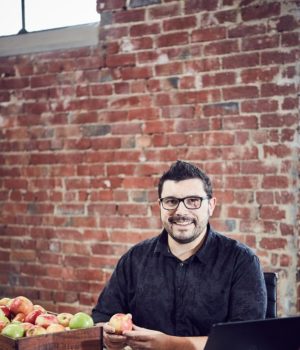Rubens Technologies is a Victorian startup addressing waste, sustainability and traceability problems of fruit and crops supply chains. Rubens Technologies has developed sensors and analytics to predict quality parameters of fruit and crops in real time, and without damaging the product.
Rubens is used to predict fruit and crop quality indicators, useful for growers to predict the optimal time for picking, to estimate optimal storage time and assess fruit for internal defects.
Rubens Technologies sensors are used to capture the ‘molecular fingerprint’ of a crop, which is uniquely related to quality, maturity and ripeness stage of that crop. Sensor data is then analysed in real time using machine learning models to provide actionable insights of the state of the fruit.
How exactly does Rubens work?
In a case study, Rubens sensors are used to predict the sugar content in fresh peaches and nectarines without damaging the products, or assess apples for sweetness and crunchiness in the field and at the packing stage.
“In the last few years we have seen an explosion of sensors and technologies aimed at the agri-food supply chains. This is going to have a huge positive impact on reducing waste and improving quality across the chain” – says Daniel Pelliccia, physicist and founder of Rubens Technologies. “Most of the available technology however provides data about the environment the product is in – such as temperature or humidity for instance – with little or no information on the product itself”.
Horticultural productions naturally have high variability, so that monitoring the product is key to reducing waste and maintaining the quality of our valuable crops along the supply chain.

The idea for Rubens Technologies was born back in 2015 inspired by discussions between Daniel and scientists at Agriculture Victoria. Daniel was then able to secure a Global Linkage Priming Grant from the Australian Government to travel to the Massachusetts Institute of Technologies to learn about light sensing technologies.
After graduating from the Runway regional accelerator in Geelong, Daniel founded Rubens Technologies and attracted a grant from the City of Greater Geelong and fund from HortInnovation that enabled the first field pilots of the sensor.
Rubens Technologies is now working on the second stage of product development to scale up its operation and attract early customers for the 2020 season.






![Four Page Digital Marketing Strategy [FREE RESOURCE]](https://anthillonline.com/wp-content/uploads/2015/01/FOUR-PAGE-IMAGE-300x194.png)
![Generating Web Traffic with Mark Middo and James Tuckerman [FREE REPORT]](https://anthillonline.com/wp-content/uploads/2015/08/Capture3-100x75.jpg)
![How to expand into New Markets with Elsita Meyer-Brandt [CHEAT SHEET]](https://anthillonline.com/wp-content/uploads/2015/07/Screen-Shot-2015-11-26-at-15.52.30-100x75.png)
![Ever considered crowdfunding? [FREE REPORT]](https://anthillonline.com/wp-content/uploads/2017/03/liz-wald-100x75.png)
![The Facebook Honey Trap with James Tuckerman [CHEAT SHEET]](https://anthillonline.com/wp-content/uploads/2015/11/Screen-Shot-2015-11-26-at-11.34.14-100x75.png)
![How did Sean Clark build a $300 million turnover company from a $500 AdWords investment? [CHEAT SHEET]](https://anthillonline.com/wp-content/uploads/2016/03/SEAN-CLARK-cheatsheet-NSFU-02.pdf-Box-2016-03-16-14-43-21-100x75.png)

![Google gets ‘The Social Network’ treatment. Internships never looked so good [VIDEO]](https://anthillonline.com/wp-content/uploads/2013/02/WilsonVaughn-300x298.jpg)
![How to turn invisible. At least from the perspective of a shark [VIDEO]](https://anthillonline.com/wp-content/uploads/2013/07/SAMS-300x350.jpg)
![The Top 5 Most Insanely Dumb Mistakes made by Rookie and Seasoned LinkedIn Users, with David Hobson [FREE REPORT]](https://anthillonline.com/wp-content/uploads/2015/07/Screen-Shot-2015-11-26-at-14.29.18-300x194.png)
![How to secure lucrative sponsorships in five steps [CHEAT SHEET]](https://anthillonline.com/wp-content/uploads/2016/02/jackie-fast-meme-04-100x75.jpg)
![Need cash for your startup or innovation? Here’s the Ultimate Grant Guide for Innovators and Startups [FREE DOWNLOAD]](https://anthillonline.com/wp-content/uploads/2015/10/INNOVATORS-GRANT-GUIDE-NFSU-page-spread-100x75.png)
![Four Page Digital Marketing Strategy [FREE RESOURCE]](https://anthillonline.com/wp-content/uploads/2015/01/FOUR-PAGE-IMAGE-100x75.png)
![Do you have happy staff? 5 ways to improve performance [FREE DOWNLOAD]](https://anthillonline.com/wp-content/uploads/2016/06/chris-smith-cheatsheet-04c.pdf-Box-2016-06-30-20-45-20-100x75.png)
![New Zealand’s Xero eyes US IPO, further disruption as subscribers increase [INFOGRAPHIC]](https://anthillonline.com/wp-content/uploads/2014/07/sruuuuujana-212x194.png)
![Ever wonder if your ‘content marketing’ is really just crap? You gotta see this! [INFOGRAPHIC]](https://anthillonline.com/wp-content/uploads/2014/08/content-100x75.jpg)
![7 Business Lessons From Game of Thrones [INFOGRAPHIC]](https://anthillonline.com/wp-content/uploads/2014/10/infographic-games-of-thrones-041-100x75.jpg)
![How to build your own Media Empire… In seven steps with Nathan Chan [INFOGRAPHIC]](https://anthillonline.com/wp-content/uploads/2014/10/Nathan-Chan-Infographic-e1413419529176-100x75.jpg)
![5 Business Lessons From Tinder [INFOGRAPHIC]](https://anthillonline.com/wp-content/uploads/2014/10/Tinder-Elegant-Infographic-100x75.jpg)



